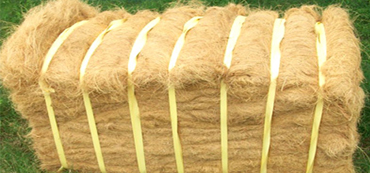Coir Fibre
Coir is a natural fibre extracted from the husk of coconut and used in products such as floor mats, doormats, brushes, mattresses, etc. Technically, coir is the fibrous material found between the hard, internal shell and the outer coat of a coconut. Other uses of brown coir (made from ripe coconut) are in upholstery padding, sacking and horticulture. White coir, harvested from unripe coconuts, is used for making finer brushes, string, rope and fishing nets.
Structure of Coir Fibre
The individual fibre cells are narrow and hollow, with thick walls made of cellulose. They are pale when immature, but later become hardened and yellowed as a layer of lignin is deposited on their walls. Each cell is about 1 mm (0.04 in) long and 10 to 20 µm (0.0004 to 0.0008 in) in diameter. Fibres are typically 10 to 30 centimetres (4 to 12 in) long. The two varieties of coir are brown and white. Brown coir harvested from fully ripened coconuts is thick, strong and has high abrasion resistance. It is typically used in mats, brushes and sacking. Mature brown coir fibres contain more lignin and less cellulose than fibres such as flax and cotton, so are stronger but less flexible. White coir fibres harvested from coconuts before they are ripe are white or light brown in color and are smoother and finer, but also weaker. They are generally spun to make yarn used in mats or rope. The coir fibre is relatively waterproof, and is one of the few natural fibres resistant to damage by saltwater. Fresh water is used to process brown coir, while seawater and fresh water are both used in the production of white coir.
Specifications of Coir Fibre
Coir Fiber Bale (A grade)
Moisture: <15%
Impurities & Dust: <3%
Color: White or Brown Coir Fiber;
Bale size 48” x 18” x 18”
Bale weight 110 to 120kgs (approx.) each strapped with Plastic
Loading Capacity: 40' HC Container: 185 Bales Approx. 21 to 22 Tons
10 - 30 Cms Length

Coir Fibre
A spongy material that binds the coconut fibre in the husk, coir pith is finding new applications. It is an excellent soil conditioner and is being extensively used as a soil-less medium for agri-horticultural purposes. With its moisture retention qualities, coir pith is ideal for growing anthuriums and orchids. Available in raw form or converted into organic manure.